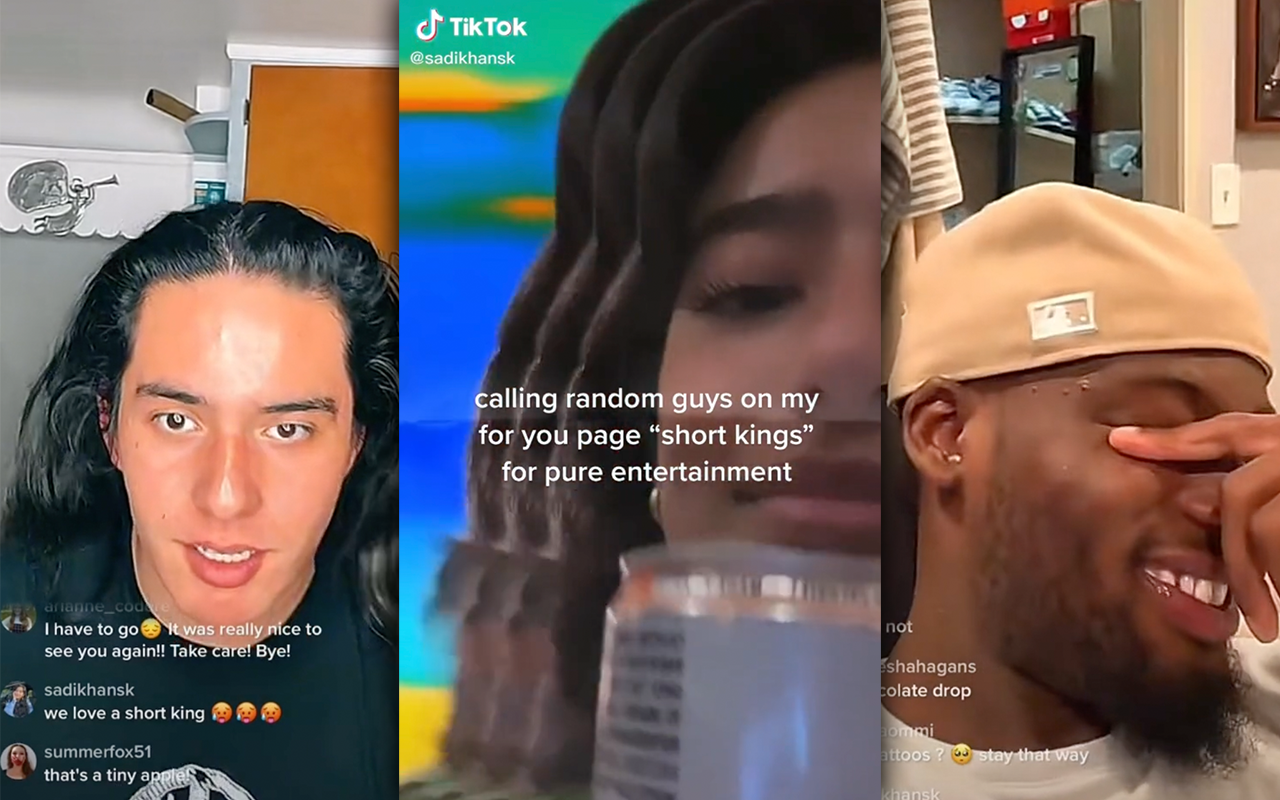
Trolling men on the Internet has (finally) become a trend, and as usual, TikTok has been at the centre of the action. The most recent manifestation of this trend sees female users joining the live streams of random men with the sole intention of sliding into their comments with the phrase “short king”.
The trend was popularised by TikTok user @sadikhansk, whose five-part video series garnered almost 20 million views within the past month. In each video, Sadia calmly sips her drink, writing, “calling guys ‘short kings’ for pure entertainment”. For the next minute, we watch as Sadia comments “we love a short king” on men’s live streams, and sits back as every man becomes visibly irritated and swears they’re at least six feet tall. Standing up, reaching for the ceiling, and outright deflecting the comment were also common responses, with one man replying, “Well you need to go find you one, ‘cause I ain’t short”.
@sadikhansk everyone in this video is 18+ #viral #fyp
♬ Wii – Mii Channel – Super Guitar Bros
Since these videos have gone viral, other girls have joined Sadia in complimenting men as a ‘short king’ on their live streams, and even pranking their own boyfriends on camera.
@lauren_hardy HAHAHAHA I didn’t know what to say….
♬ original sound – Lauren Hardy
The comments on these videos are equally entertaining, with girls pointing out how defensive the men are. One user commented, “I really love that you’re complimenting all of them, but all they see is SHORT”, while another user said, “not all of yall are 6ft”.
But another interesting theme to note is the difference between how men talk about women and how women talk about men. One user commented, “Men will talk in the most degrading way about women but can’t handle being called short”. Another girl said similarly, “Yet they call women the [vilest] things and you say short KING, and they spiral”.
We see this double standard even within other TikTok comedy trends, like the ‘girls at brunch’ skits in which a table of men film themselves mocking how girls take Instagram stories when out for brunch.
@next8level The girls are back 🥰🤪 – Tag your besties 🥰😘 #girlsbelike #brunch
♬ A Thousand Miles (Instrumental Playback) – Professional Piano
Despite its intended humour, the ‘short king’ joke plays into a broader conversation about fragile masculinity— characterised by the anxiety that men feel when they believe they are not living up to societal expectations of manhood. Social media trends have increasingly highlighted this social phenomenon, as we saw last year with the “you look like you can’t swim” prank that triggered similarly defensive responses.
@thequeencaitlin Tell your husband they look like they can’t swim 🤣 #olympian #selenanetflix #BagelBopsContest #WildAnimals #fyp #husband
♬ original sound – Caitlin Palmer
Another TikTok series of same nature is @kyleprue’s “How to Upset Men”, where Kyle provides inflammatory one-liners for women posed as innocent questions that are guaranteed to make any Brad or Chad’s blood boil. Some of his sick burns include, “Do you have a friend that knows a good gym?”, and “Where did you learn that?”.
@kyleprue how to upset men part seven #fyp #jonahhill #piersmorgan #newtgingrich #gym #fitness #manchesterunited #goarmy #investment #nftartwork #polyamory
♬ original sound – Kyle Prue
All these trends show an increasing awareness of fragile masculinity and how to exploit it to trigger an entertaining response. But another issue raised by the ‘short king’ trend is how prevalent insecurity is amongst men— a factor that is rarely highlighted or publicly discussed. Many TikTok users have noted that if the roles were reversed, the trend would not be as funny. One user commented, “Girls get mad when men target something they are self-conscious about but defend this behaviour. The double standard is insane”.
Whether this is a fair comparison or not, we can all do well to remember that commenting about someone’s physical appearance can be hurtful or triggering, no matter who they are. While body image and insecurity are most commonly conversations concerning women, the ‘short king’ trend has shown that men are equally sensitive to comments about their physical appearance, even when the comments are made in jest.
That being said, it’s not often that we get to collectively troll men for fun, so I, for one, will continue to enjoy the ‘short king’ content while it lasts.

